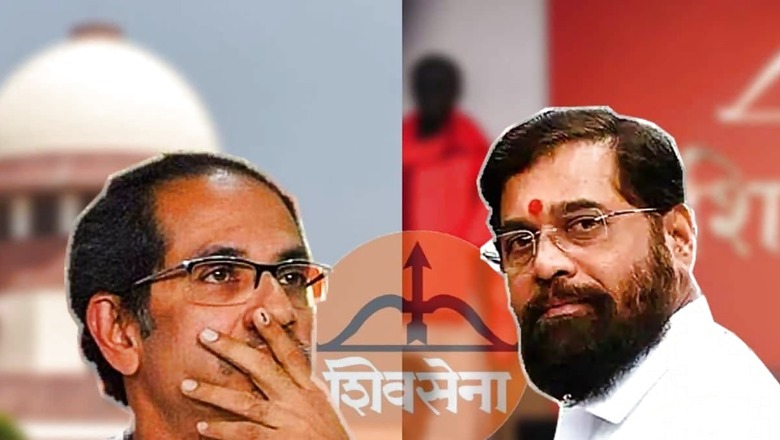
views
In what could decide the fate of Maharashtra politics, a five-judge bench of the Supreme Court will on Thursday pronounce its order over the petitions concerning the situation which unfolded after Eknath Shinde’s rebellion against the Maha Vikas Aghadi (MVA) government.
A Constitution bench headed by Chief Justice of India (CJI) D Y Chandrachud, with its judgment on Thursday, will decide some important questions of law which would also set the law straight for such intra-party disputes in the future and the use and application of the anti-defection law.
After the 2019 Maharashtra assembly polls, the Uddhav Thackeray-led Shiv Sena snapped ties with the Bharatiya Janata Party (BJP) over the issue of sharing the chief ministerial post. Thackeray later tied up with the Sharad Pawar-led Nationalist Congress Party (NCP) and the Congress to form the MVA government in the state. Thackeray’s government collapsed in June last year after a revolt against the Sena leadership by Shinde and 39 other legislators. On June 30, Shinde became the Maharashtra Chief Minister with BJP leader Devendra Fadnavis as his deputy.
The bench also comprising Justices MR Shah, Krishna Murari, Hima Kohli and P S Narasimha will decide whether the notice for removal of a Speaker restricts him from continuing with disqualification proceedings under the 10th Schedule of the Constitution, as held by this Court in Nebam Rebia judgment.
With regards to the powers of the Election Commission, the top court will also rule on what is the scope of the powers of the Election Commission of India with respect to the determination of a split within a party.
Some other questions that the court will decide on are as follows:
- Can a Court hold that a member is “deemed” to be disqualified, by virtue of his/her actions, absent a decision by the Speaker?
- What is the status of proceedings in the House during the pendency of disqualification petitions against the members?
- If the decision of a Speaker that a member has incurred disqualification under the 10th Schedule relates back to the date of the action complained of, what is the status of proceedings that took place during the pendency of a disqualification petition?
- What is the impact of the removal of Paragraph 3 of the 10th Schedule?
- What is the scope of the power of the Speaker to determine the Whip and the leader of the house legislature party? What is the interplay of the same with respect to the provisions of the 10th Schedule?
- Are intra-party decisions amenable to judicial review? What is the scope of the same?
- What is the extent of discretion and power of the Governor to invite a person to form the Government, and whether the same is amenable to judicial review?
#BreakingNews | Sanjay Raut: EC has not given such decision for any party which they had given for #ShivSena. Was Election commissioner appointed or was brought in the haste just to deliver such order?| @mayuganapatye@mihirz @anjalipandey06 @anany_b pic.twitter.com/pd2HaPelta— News18 (@CNNnews18) February 21, 2023
THE HEARING
During the course of the hearing, the Governor of Maharashtra told the Apex Court that the 10th Schedule is not a weapon to stifle dissent, it is to control unprincipled defection.
“The 10th Schedule is to not a weapon to stifle bona fide legitimate dissent but it is to control unprincipled defection. Unbridled power takes away the confidence of MLAs and they cannot effectively exercise their freedom of conscience,” said Mehta in the court.
Opposing the submissions made by the solicitor general, senior advocate Kapil Sibal, representing the Uddhav Thackeray camp, said, “The SG (solicitor general) cannot argue in his own individual capacity. He has to say that he is speaking for the governor.”
He added: “Either he says we have a fundamental right to buy off people.”
Sibal also argued before the court that the politics of defections does not have to be decided in the house. “You have to go back to the political party. Here, there is no split in the party. There is a split in the house. Eknath Shinde was one the 16 and he has become the chief minister,” the senior lawyer said.
“If someone has ambitions, pressures on them that can’t be spoken of in public, they will hop over”: Shiv Sena’s @AUThackeray on what led to crisis in Shiv SenaWatch #CNNNews18Townhall LIVE now: https://t.co/z13U3QjoD8 | @Zakka_Jacob @vinivdvc #Mumbai #Maharashtra pic.twitter.com/YX2a8Slhgq
— News18 (@CNNnews18) September 10, 2022
HOW CAN WE REINSTATE A CM WHO DID NOT EVEN FACE FLOOR TEST: COURT ASKS UDDHAV CAMP
While the court was considering the submissions of both the sides, Justice M R Shah questioned the Uddhav camp, “How can the Court reinstate the Chief Minister who didn’t face the floor test?”
Responding the query, Senior Advocate Abhishek Manu Singhvi said, “Your lordships aren’t reinstating anyone. Your lordships are restoring status quo ante.”
“Look at the intellectual conundrum. It’s not that you’ve been ousted from power as a result of the trust vote which was wrongly summoned by the Governor. You chose not to face it,” said CJI Chandrachud.
“After I filed the petition, after I made it sub judice, and after I said its completely unknown to law and don’t allow it to go on,” said Singhvi.
The CJI then responded, “You’re frankly accepting the fact that you resigned because of the Trust Vote was going to go against you.”




















Comments
0 comment